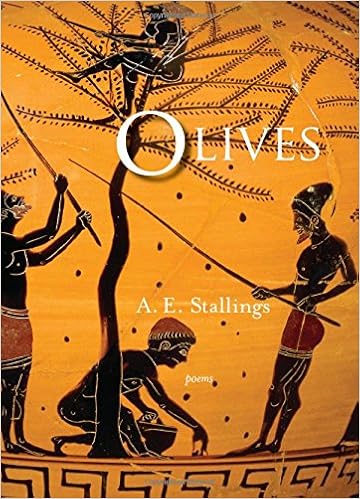
"Olives" harvests 43 poems by A. E. Stallings, a poet living in Athens, a classicist, translator, writer who has received much acclaim. She shares with another A. E. (poet A.E. Housman) a fluency in the austere beauty of Greek poetry & a piercing wry wit that is very much her own.
There are many reasons to like this book. For example,
---the triolet may be among the more devilishly delightful forms so there is a special joy in seeing it done with wit, understanding, and grace. I had a grin that went three times around my face on reading Stallings' "Triolet on a Line Apocryphally Attributed to Martin Luther," beginning with her alliterative choice of "apocryphally" rather than "erroneously."
"Why should the Devil get all the good tunes?
The booze and the neon and Saturday night,
The swaying in darkness, the lovers like spoons?
Why should the devil get all the good tunes?
Does he hum them to while away sad afternoons,
Or the long, lonesome Sundays? Or sing them for spite?
Why should the Devil get all the good tunes,
The booze and the neon and Saturday night?"
---it's great hearing the music of the muse of poetry
---what Stallings writes about seems worth thinking about, be it mortality in the cemetery in Athens, the tensions and reconciliations of relationships, the evanescence of childhood.
---there are resonances in many lines that can make us smile, as in the echo of "Ode on a Grecian Urn" in the last two lines of her "Pop Music for a New Parent":
"....At this almost-safe distance, and you weep or nearly weep
For all you know of beauty, or of truth."
--A sense of balance and of encompassing a range of weathers honestly, compassionately, and wisely.
ABOUT THE BOOK
"Olives" presents four themes: I The Argument (12 poems), II Extinction of Silence (12 poems), III Three Poems for Psyche, and IV Fairy Tale Logic (14 poems). The book brings together poems printed earlier in magazines such as "Poetry," "The Atlantic Monthly," and "Valpairiso Poetry Review."
Most are brief, although Stallings elsewhere has longer work, such as her translation of Lucretius' "De Rerum Natura." Applause to the magazine editors and to the selection committees for the awards Stallings has received, including a Guggenheim Fellowship and a MacArthur Award.
ANY READER ALERTS? Not really. 67 pages may seem slim, but this is about what we have of Catallus, and for me, the net has come up from the sea glittering and full.
For some readers, rhymed and formally structured poetry may seem retrograde and a whole book of it, too much of a not-so-good thing. Stallings may not be their glass of retsina.
For myself, I like Houseman, Hopkins, and Heany and am glad, very glad, Stallings is here. This is a book to enoy yourself and specially to share with readers who want to know what some beautiful contemporary poetry is like. Anassa Kata, A. E. Stallings!
No comments:
Post a Comment